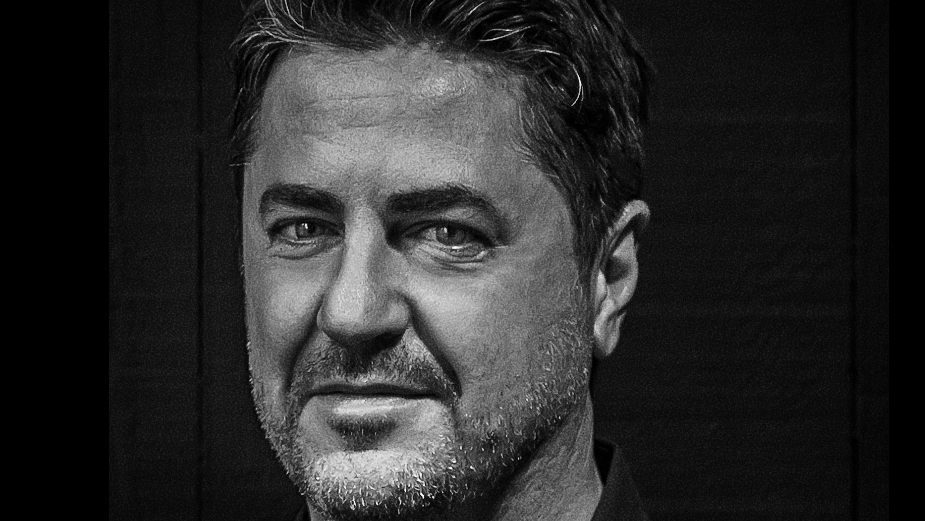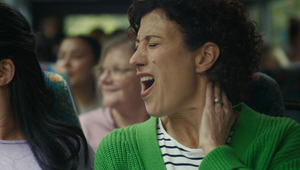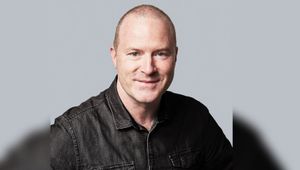
5 Minutes with… Anthony Gregorio

Anthony Gregorio’s journey into the creative industry has a pleasing symmetry to it. He began his working life as a marketing executive for a bank in Australia before moving to the UK. And now after three decades and a few job swaps, that same bank is a client of Saatchi & Saatchi where he is CEO of the Australia team.
His career has taken him from his home in Australia to the UK where he learnt the art of downing pints – and to keep up standards at work – and now back to Australia where he heads up one of the country’s biggest agencies.
LBB’s Natasha Patel caught up with Anthony to hear about his parents’ post-war move from Italy to Australia, why he views his time at Saatchi & Saatchi as a divide between before Covid and after Covid and why he believes you don’t need to be a “dick to be successful”.
LBB> You’ve worked in the creative industry for three decades now which is no mean feat! When you were growing up was advertising always on the cards for you?
Anthony> I grew up the son of economic migrant parents from Italy, who came here to Australia with nothing in order to build a life in the post-war boom. My siblings and I had a happy childhood and whilst we never wanted for anything, we were firmly working class with not a lot of disposable income. As a youngster, those dynamics shaped a curiosity and creative approach in me to the way I found enjoyment and viewed the world. I have always taken those attributes with me through life and I’m sure they played a big role in me forging a career in advertising.
LBB> And from that childhood curiosity, where did your career go?
Anthony> My first proper job was a marketing role at St. George Bank, which is now a client at Saatchi & Saatchi. I spent three years there and loved it. I then went travelling to Europe and on return to London, I was lucky enough to land my first agency role at Kingsland Lloyd Petersen (which eventually became part of Havas). I spent almost three years there and it firmly cemented my love of using creative thinking to solve problems.
LBB> How did you find the move from Australia to London and then back again and what impact did the different countries have on your creativity?
Anthony> I was young and it was the ‘90s (which feels like, and actually was, a life-time ago). It was a very exciting time to be working in a different country and London was not only the epicentre of the advertising scene at that time, but leading the ‘cool Britannia’ trend which was building globally. Great agencies, great city with the quality of the work as the absolute focus.
Wearing rose-tinted glasses, it felt like a less complicated time where anything seemed possible; though I’m sure it wasn’t. And whilst it was fun, there was also a brutal nature to the environment which meant your performance was held to a very high standard. Overall a great learning experience from a career perspective. Plus, I got very proficient at sinking pints quickly before closing time at the pub.
The discipline around creating great work I learnt in the UK, has stayed with me. The pace of the way we work has changed as has the channels and formats we create ideas to live within. What doesn’t change is being rigorous around defining the problem, getting a deep understanding of your audience, uncovering a motivating human truth and creating an idea that can address it all and live in an organic way across a multitude of touch points. Simple.
LBB> Since becoming CEO at Saatchi two years ago, what changes have you seen in the industry?
Anthony> I think it’s a tale of two eras – Before Covid and After Covid.
Before Covid, digital transformation has been changing the landscape for years, albeit at a pace we could manage. Now everything is accelerating, often at a breakneck pace. We are getting to places in the industry in six to 12 months that might have taken three to five years.
The impacts to our industry have been mixed. The big positive for me is, in a world where data and technology is becoming parity, creativity is still king.
LBB> Tell us more how you’ve found working through Covid.
Anthony> Like most people have commented, there have been both positives and negatives to WFH. I’m lucky being Sydney based, I have the option of being in the office when it suits me. I think we are in for more permanent shifts in the way we balance working from home versus the office. I can see we will end up having office space much more for meetings and collaboration sessions, with home being used more for thinking. But of course, that’s coming from someone that doesn’t have young children anymore. So we need to offer flexibility.
LBB> And with that in mind which Covid-related campaigns have caught your eye?
Anthony> Well I would normally not blow our own trumpet, but our Donation Dollar work for the Royal Australian Mint was pushed through due to Covid. The world’s first legal tender currency, designed to be given, not spent. One is being minted for every Australian, creating 25 million reminders to donate, not just in times of crisis, but all year round.
LBB> Do you have a plan of how you'd like to steer the company into the future and post-Covid?
Anthony> It’s a back to basics plan where we reinforce Saatchi & Saatchi as a name that is famous for creativity in all its guises. And we execute the plan with good grace and humour.
LBB> What does the role of CEO at Saatchi & Saatchi Australia mean to you, was it something you always strived for?
Anthony> Starting my career in the early ‘90s, Saatchi & Saatchi was THE agency brand to work at. It’s still the most famous brand in advertising. It took me a while, but to finally get a gig here is something I’m very proud of.
In reality, the success of any agency is a function of their people and desire to do great work. Luckily, I have both here. Great people and a creative legacy that ensures we don’t rest on our laurels. Doing great work at Saatchi is not a ‘nice to have’, but a must have. You feel it the moment you walk through the door. Part of our induction to staff is to explain to them: you’re at Saatchi & Saatchi to do the best work of your career, and once you arrive here, ‘Nothing Is Impossible’.
LBB> With that in mind, what prompted the move from Havas to Saatchi & Saatchi?
Anthony> I’d been at Havas for over 15 years. I started at The Moult Agency where Tom Moult (who remains a mentor and friend) hired me as a very green managing director. That was fully acquired by Havas, and I helped to start and eventually became the CEO of The Furnace, a boutique creative offer that was part of the group.
And then I got the role of CEO of the parent brand Havas. And whilst I didn’t feel like I worked at the one agency for that long a period of time, I had run my course. The group wanted to make changes and it gave me an opportunity to take some time out and plot my next move, which I happily took. I have fond affection for the brand and many friends still at Havas.
LBB> How would you describe your managerial style?
Anthony> Benign dictatorship. I’ve always believed that you don’t need to be a dick to be successful.
LBB> Where does your drive come from and what inspires and motivates you?
Anthony> My drive comes from my humble background. It’s not uncommon for those from a similar background to prove they can succeed without the advantage they perceive others might have had.
My inspiration and motivation come from many places; my family, music, art, books, movies. And whenever I see a great campaign I wish my agency had done, it gets me revved up.
LBB> Outside of work how do you spend your time?
Anthony> I have played guitar on and off for many years, and in these crazy times, I have recently rediscovered the joy and stress relieving qualities of strumming a tune. I try and play a little most nights after dinner, even if only for 15 minutes.










